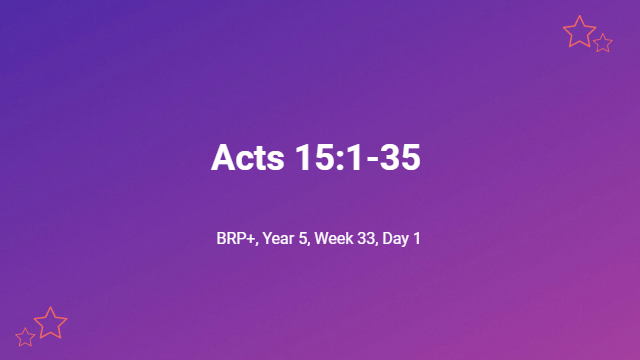Acts 15:1-35
Q.1. What objection was raised by the Jewish believers from Judea? How did the Antioch Church propose to break the deadlock? How was their report received? – (Acts 15:1-5)
There were Jewish believers from the tradition of the Pharisees, who added to the gospel proclaimed to the Gentiles. They taught – 1 … Unless you are circumcised according to the custom of Moses, you cannot be saved … 5 It is necessary to circumcise them and to direct them to observe the Law of Moses (Acts 15:1 & 5). This brought much contention and debate. To break the deadlock, the church decided to seek for a ruling from the ‘mother’ church and sent representatives – … to Jerusalem to the apostles and elders concerning this issue (Acts 15:2). On the way, Paul and Barnabas were – … describing in detail the conversion of the Gentiles and were bringing great joy to all the brethren (Acts 15:3). They then arrived at the church in Jerusalem and laid their concerns before the apostles and prophets (see Acts 15:4-5).
Q.2. Who was responsible to preserve the apostles’ doctrine? What testimony did Peter add to the discussion? How did he understand the gospel? – (Acts 15:6-11)
Some of the apostles were still alive. God kept them in Jerusalem, in spite of persecution, to establish the truth of the gospel (see Acts 8:1). They were joined by the elders of the Jerusalem church who were the new generation of leaders committed to holding fast to the truth (see Acts 15:6 c.f. Acts 20:28-32). The nature of the gospel was hotly debated. Then Peter once more shared the testimony of his vision from God (see Acts 10:9-16), and the resultant transformation of the Gentiles (see Acts 10:34-48), which had been accompanied by the same signs they experienced at Pentecost (see Acts 15:7-9). He opposed placing rules on the new believers, that the Israelites themselves had failed to keep. – Since we believe that we are saved through the grace of the Lord Jesus, in the same way as they also are (see Acts 15:11).
Q.3. What was the impact of the testimony of Barnabas and Paul? How did James support the other speakers? How was the issue resolved? – (Acts 15:12-22)
The testimony of the respected Barnabas, as well as Paul’s report of God’s endorsement of their ministry to the Gentiles, made its mark. James, the leader of the Jerusalem church, then summed up. He stated that the new direction of including the Gentiles had been given to Peter and was supported by the Old Testament Scriptures in Amos 9:11-12, and the other prophets. In deference to Jewish believers, and so as not to cause division, he proposed – that we write to them that they abstain from things contaminated by idols and from fornication and from what is strangled and from blood (Acts 15:20). This ruling was ratified by the whole church. A letter was sent to Antioch, along with some leading men of their number to report on the outcome of this historic Jerusalem Council (see Acts 15:22).
Q.4. How were Paul and Barnabas perceived by the leaders? What was their new commission? What restrictions were placed on the Gentiles? – (Acts 15:22-29)
The Jerusalem church distanced themselves from the Judaizers. They commended Barnabas and Paul as – men who have risked their lives for the name of our Lord Jesus Christ (Acts 15:26). The Jerusalem church was represented by Judas and Silas, who were to share the ruling to the Gentile converts, with the proviso – that you abstain from things sacrificed to idols and from blood and from things strangled and from fornication … (Acts 15:29).
Q.5. How was the letter received by the believers at Antioch? What was the role of Judas and Silas? How was the church in Antioch strengthened? – (Acts 15:30-35)
The decision brought tremendous joy (see Acts 15:31). Judas and Silas – … being prophets themselves, encouraged and strengthened the brethren with a lengthy message (Acts 15:32). Silas stayed and joined Paul and Barnabas in establishing the church at Antioch (see Acts 15:34-35). Unity between believers, and clarity of understanding the truth, always result in much joy and growth.

